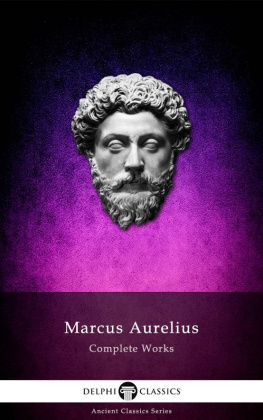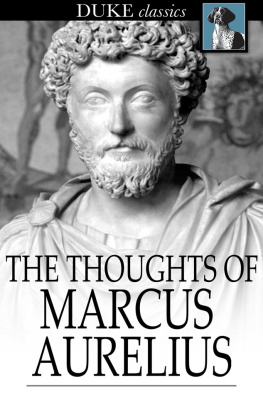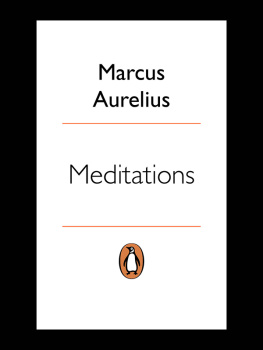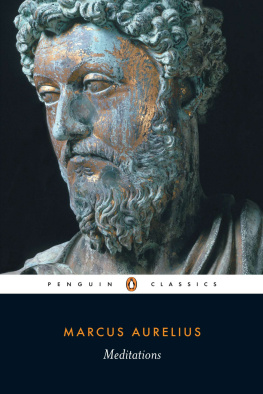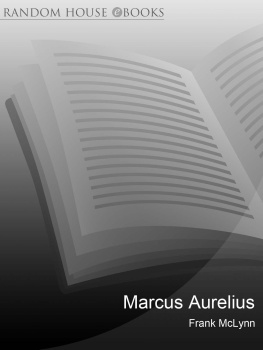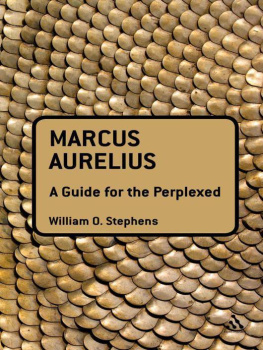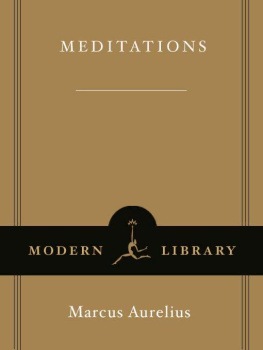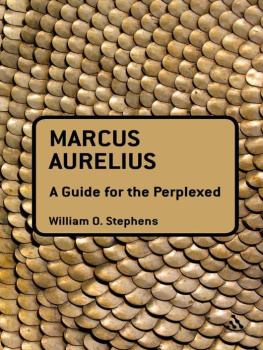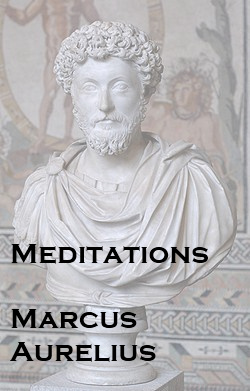Marcus Aurelius - Complete Works of Marcus Aurelius
Here you can read online Marcus Aurelius - Complete Works of Marcus Aurelius full text of the book (entire story) in english for free. Download pdf and epub, get meaning, cover and reviews about this ebook. year: 2016, publisher: Delphi Classics, genre: Science. Description of the work, (preface) as well as reviews are available. Best literature library LitArk.com created for fans of good reading and offers a wide selection of genres:
Romance novel
Science fiction
Adventure
Detective
Science
History
Home and family
Prose
Art
Politics
Computer
Non-fiction
Religion
Business
Children
Humor
Choose a favorite category and find really read worthwhile books. Enjoy immersion in the world of imagination, feel the emotions of the characters or learn something new for yourself, make an fascinating discovery.
- Book:Complete Works of Marcus Aurelius
- Author:
- Publisher:Delphi Classics
- Genre:
- Year:2016
- Rating:5 / 5
- Favourites:Add to favourites
- Your mark:
- 100
- 1
- 2
- 3
- 4
- 5
Complete Works of Marcus Aurelius: summary, description and annotation
We offer to read an annotation, description, summary or preface (depends on what the author of the book "Complete Works of Marcus Aurelius" wrote himself). If you haven't found the necessary information about the book — write in the comments, we will try to find it.
Complete Works of Marcus Aurelius — read online for free the complete book (whole text) full work
Below is the text of the book, divided by pages. System saving the place of the last page read, allows you to conveniently read the book "Complete Works of Marcus Aurelius" online for free, without having to search again every time where you left off. Put a bookmark, and you can go to the page where you finished reading at any time.
Font size:
Interval:
Bookmark:
The Complete Works of
MARCUS AURELIUS
(121 AD 180 AD)

Contents

Delphi Classics 2014
Version 1

The Complete Works of
MARCUS AURELIUS

By Delphi Classics, 2014
Complete Works of Marcus Aurelius
First published in the United Kingdom in 2014 by Delphi Classics.
Delphi Classics, 2014.
All rights reserved. No part of this publication may be reproduced, stored in a retrieval system, or transmitted, in any form or by any means, without the prior permission in writing of the publisher, nor be otherwise circulated in any form other than that in which it is published.
Delphi Classics
is an imprint of
Delphi Publishing Ltd
Hastings, East Sussex
United Kingdom
Contact: sales@delphiclassics.com
www.delphiclassics.com

Crdoba, Andalusia Marcus family originated from this area of Iberian Baetica. He was born in Rome on 26 April 121 AD.

Translated by C. R. Haines
(The thoughts addressed to himself) is a series of personal writings composed by Marcus Aurelius, the Roman emperor from 161 to 180 AD, which present the authors ideas on Stoic philosophy. Marcus wrote the Meditations in Koine Greek, an Alexandrian dialect common during Hellenistic and Roman antiquity, as a source for his own guidance and self-improvement. It is possible that large portions of the work were written at Sirmium, where the emperor spent much time planning military campaigns from 170 to 180. Some of the text was written while he was positioned at Aquincum on campaign in Pannonia, as internal notes reveal that the second book was written when he was campaigning against the Quadi on the river Granova and the third book was written at Carnuntum. It is not clear that he ever intended the writings to be published, so the title Meditations is only one of several commonly assigned to the work. The text mostly takes the form of quotations varying in length from one sentence to long paragraphs.
The Meditations is divided into twelve books, chronicling different periods of Marcus life, arranged in no chronological order and composed for no audience but the emperor himself. The writing style is simplified and concise, reflecting Marcus Stoic perspective on life, whilst portraying its author not as an empirical figure, but as a man among other men, allowing the reader to relate to his wisdom.
A central theme of the text is the analysis of judgement of self and others and the developing of a cosmic perspective. Marcus argues, You have the power to strip away many superfluous troubles located wholly in your judgement, and to possess a large room for yourself embracing in thought the whole cosmos, to consider everlasting time, to think of the rapid change in the parts of each thing, of how short it is from birth until dissolution, and how the void before birth and that after dissolution are equally infinite. He advocates finding ones place in the universe, believing that as everything has come from nature, so everything must return in due time. Another major theme of the work is the importance of maintaining focus and to be without distraction, while maintaining strong ethical principles, such as Being a good man.
Marcus Stoic ideas often involve eschewing indulgence in sensory affections, a skill that will free a man from the pains and pleasures of the material world. He claims that the only way a man can be harmed by others is to allow his reaction to overpower him. An order or logos permeates existence. Rationality and clear-mindedness allow one to live in harmony with the logos. This allows one to rise above faulty perceptions of good and bad.
The Meditations has endured as a potent expression of Stoic belief and remains a central text for students of Stoicism, as well as a unique personal guide to the attainment of a moral life.

Marcus Aurelius as a boy, from the villa of Antoninus Pius in Lanuvio, c. 140 AD

Marcus Aurelius, c. 160 AD, Glyptothek Munich

Antoninus Pius (86-161 AD), Marcus adoptive father and predecessor as emperor; bust housed in the Glyptothek, Munich. Antoninus acquired the name Pius after his accession to the throne, either because he compelled the Senate to deify his adoptive father Hadrian or because he had saved senators sentenced to death by Hadrian in his later years.

Faustina the Younger, Marcus wife; the Louvre

If thou wouldst master care and pain,
Unfold this book and read and read again
Its blessed leaves, whereby thou soon shalt see
The past, the present, and the days to be
With opened eyes; and all delight, all grief,
Shall be like smoke, as empty and as brief.

1 This epigram is found at the end of the Vatican MS. and also in the Anthologia Palalina, ii. p. 603 (Jacobs). Possibly by Arethas (see P. Maas in Hermes xiviii. p. 295 ff. ).
The Greek text of this book is often difficult and in many places corrupt beyond cure, but no trouble has been spared to make the translation as accurate and idiomatic as possible. I have preferred to err, if error it be, on the side of over-faithfulness, because the physiognomy of the book owes so much to the method and style in which it is written. Its homeliness, abruptness, and want of literary finish (though it does not lack rhetoric) are part of the character of the work, and we alter this character by rewriting it into the terse, epigrammatic, staccato style so much in vogue at the present day. Another reason for literalness is that it makes a comparison with the Greek, printed beside it, easier for the unlearned. When a work has been translated so often as this one, it is difficult to be original without deviating further from the text, but I have not borrowed a phrase, scarcely a word, from any of my predecessors. If unconscious coincidences appear, it remains only to say Pereant qui ante nos nostra dixerint! Numerous references (such as have proved so invaluable for the due understanding of the Bible) and good indices have always been greatly wanted in the translations of this work, and I have taken pains to supply the want. For a better understanding of the character of Marcus I have added to the Thoughts translations of his Speeches and Sayings , with a Note on his attitude towards the Christians (in which I am glad to find myself in complete agreement with M. Lemercier). A companion volume on the Correspondence with Fronto will contain all his extant Letters. In conclusion my best thanks are due to Messrs. Teubner for permission to use their text as the basis of the revised one here printed, to Professors Leopold and Schenkl for advice and help on various points, and, last but not least, to my predecessors in the translation of this Golden Book.
Next pageFont size:
Interval:
Bookmark:
Similar books «Complete Works of Marcus Aurelius»
Look at similar books to Complete Works of Marcus Aurelius. We have selected literature similar in name and meaning in the hope of providing readers with more options to find new, interesting, not yet read works.
Discussion, reviews of the book Complete Works of Marcus Aurelius and just readers' own opinions. Leave your comments, write what you think about the work, its meaning or the main characters. Specify what exactly you liked and what you didn't like, and why you think so.

